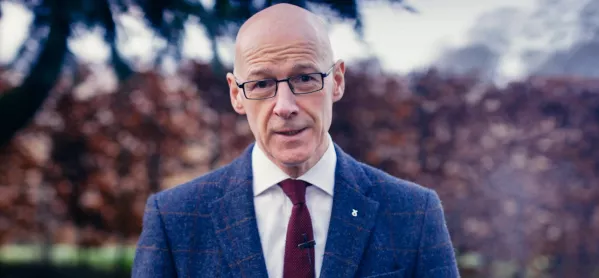Scottish education secretary John Swinney has remained non-committal on whether teachers could be prioritised for coronavirus vaccines.
Mr Swinney was asked today whether professions such as teachers and police officers could be first in line after the ongoing initial phase of the vaccination programme.
He would only say, however, that the government would seek “further advice” before making any decision.
Background: Prioritise teachers for Covid vaccinations, union says
Coronavirus: Teacher vaccine won’t help schools open, says top medic
Also today: Protecting pupils’ mental health during Covid - and beyond
The possibility of teachers and police officers being prioritised was raised when Mr Swinney, who is also deputy first minister, took questions from journalists after leading today’s Scottish government coronavirus briefing.
“We’re obviously following very carefully the advice of the Joint Committee on Vaccination and Immunisation (JCVI) about the prioritisation of who should get the vaccine first, and in what order,” said Mr Swinney.
Coronavirus: Phased return of school pupils possible
“The joint committee is very clear that you should vaccinate on the basis of the greatest exposure to risk, of serious illness and mortality through the virus.”
Mr Swinney stressed that most vulnerable people are being given the “greatest degree of protection at the earliest possible opportunity”, such as residents of care homes.
He added that some teachers and police officers would be in priority groups during the initial vaccine rollout, regardless of their profession.
“There are obviously further discussions going on about what the prioritisation should be thereafter,” said Mr Swinney, with government and “all of our relevant stakeholders” involved.
He said it was “important that we concentrate first of all on ensuring successful delivery of the vaccination programme”.
He said the government would take “further advice” from the JCVI on who should be prioritised next.
Mr Swinney was also asked about the notice teachers and parents would be given before school buildings reopen fully, after previously indicating that a phased return of pupils might be favoured.
He said: “It’s more likely we’ll bring back different cohorts of pupils, and we are exploring that within the scientific and clinical advice available to us.
“Ideally, I’d like to give two weeks’ notice to everyone involved about a return to face-to-face learning, but obviously we may need shorter notice than that if we believe the opportunity exists for such an approach to be taken. When you’re opening up the system, frankly it’s easier to give shorter notice than when you’re shutting it down. But we will give as much notice and clarity as possible.”
Mr Swinney also announced more support for childminders - many of whom have seen their businesses suffer as a result of coronavirus restrictions.
He said up to £1 million of Scottish government cash was being used to help those who have been financially affected.
Mr Swinney said further information on how to apply for this help would be published soon but added that childminders would be able to apply for grants of up to £1,000 each.
He said: ”Childminders play a hugely important role and the work they do is valued and appreciated by families across the country.
“This new fund will provide them with some of the support they need in order to continue to carry out that role. That is something that will be increasingly important as we emerge from lockdown and as more parents return to work.”
